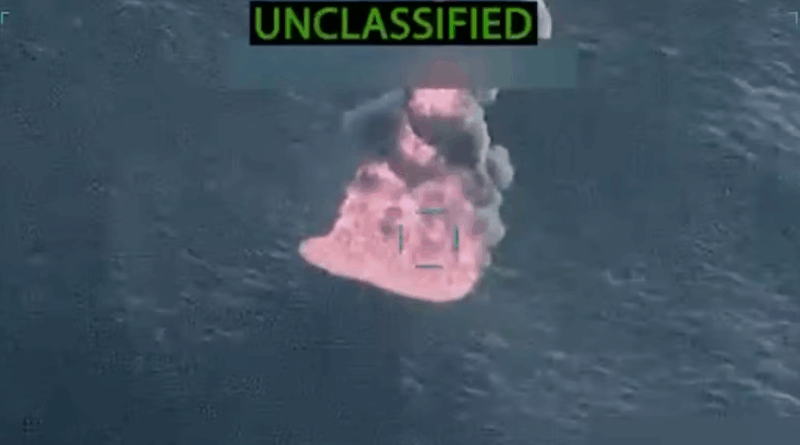U.S. Takes Out 14 ‘Narco-Terrorists’ In Pacific Drug Boat Strikes
In a dramatic escalation of the U.S. war on drug cartels, Secretary of War Pete Hegseth confirmed Tuesday that the U.S. military conducted a series of high-precision strikes on four drug-smuggling vessels in the Eastern Pacific, leaving 14 suspected narco-terrorists dead.
The strikes, ordered by President Donald Trump, targeted boats operated by Designated Terrorist Organizations (DTOs) in international waters. No U.S. forces were harmed in the operation.
Yesterday, at the direction of President Trump, the Department of War carried out three lethal kinetic strikes on four vessels operated by Designated Terrorist Organizations (DTO) trafficking narcotics in the Eastern Pacific.
The four vessels were known by our intelligence… pic.twitter.com/UhoFlZ3jPG
— Secretary of War Pete Hegseth (@SecWar) October 28, 2025
“We Will Hunt and Kill Them”
“These narco-terrorists have killed more Americans than Al-Qaeda, and they will be treated the same,” Hegseth wrote on X. “We will track them, we will network them, and then, we will hunt and kill them.”
Hegseth detailed that the boats were traveling along known drug-trafficking routes and were identified by U.S. intelligence assets as being connected to foreign DTOs. The first vessel carried eight armed suspects, the second four, and the third three. One individual survived the third strike and was taken in by Mexican search-and-rescue teams for medical treatment and possible interrogation.
The Pacific Is Now in Play
The Monday operation marks a major shift in geographic focus for the Trump administration’s anti-cartel campaign. While prior strikes largely targeted smuggling corridors in the Caribbean, this is the most aggressive known action taken in the Eastern Pacific — a region increasingly used by drug traffickers to bypass U.S. surveillance in the Atlantic.
“The Department has spent over TWO DECADES defending other homelands,” Hegseth said. “Now, we’re defending our own.”
Trump’s Doctrine: Kinetic, Relentless, Homeland-Focused
Under Trump’s orders, the U.S. military has adopted a more aggressive posture against transnational drug cartels, now classified as terrorist organizations by the War Department. Intelligence-sharing with allies in Latin America has expanded, and lethal force is being used under executive authority without waiting for traditional congressional war declarations.
Just days before this latest strike, the Pentagon deployed the Gerald R. Ford Carrier Strike Group toward South America to support maritime interdiction operations.
“This enhanced U.S. force presence will bolster our capacity to detect, monitor, and disrupt illicit actors and activities that compromise the safety and prosperity of the U.S. homeland,” said Chief Pentagon spokesman Sean Parnell.
Legal and Political Debate Brewing
While the operation has drawn praise from Trump supporters and border-state lawmakers, some in Washington are raising alarms. A group of Democratic and libertarian-aligned Republicans argue that using military force on suspected narco-traffickers, even in international waters, should require explicit congressional authorization.
President Trump has rejected those concerns outright. “We don’t need a declaration of war to protect our families from foreign poison,” he said last month. “If you’re smuggling death into our country, you’re a military target.”
From Drones to Carriers: A New Phase in Trump’s War on the Cartels
With Monday’s deadly operation and the deployment of a U.S. carrier strike group, the Trump administration has opened a new front in the global campaign against transnational drug organizations — treating them as armed enemies of the state, not just criminals.
From the Oval Office to the high seas, Trump’s message is unmistakable: if you traffic fentanyl, cartel cash, or human lives toward America’s shores, the U.S. military will meet you — with overwhelming force.

